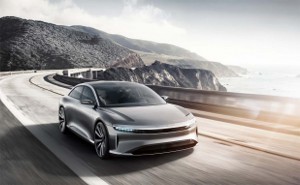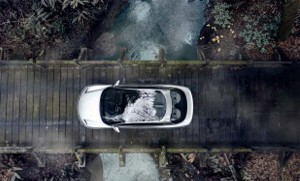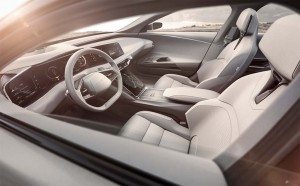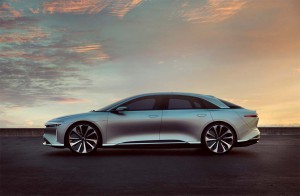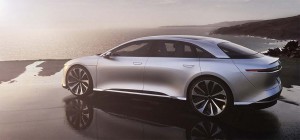It’s getting to the point where you can’t tell the new battery-car start-ups without a scorecard, California-based Lucid Motors the latest to charge onto the field.
Where a growing number of new and more established entrants into the EV market plan to target the mainstream, Lucid Motors is going after the extreme luxury segment with the Lucid Air sedan it unveiled this week, a vehicle that company officials are likening to “a private jet on four wheels.”
It’s nearly as fast, the 1,000-horsepower battery-electric vehicle set to launch from 0 to 60 in as little as 2.5 seconds – or even faster than a Tesla Model S in Ludicrous Mode. The Lucid Air also boasts about 25% more range than the new Model S P90d, as much as 400 miles per charge. And, at $160,000 for a fully loaded version, it will be a fair bit more expensive than a top-end Tesla.
The comparisons might make even more sense when you realize that Lucid’s Chief Technology Officer is Peter Rawlinson, once part of the brain trust founder and CEO Elon Musk put together to make the Tesla Model S a reality.
There has been a flood of new players entering the battery-car space lately – a list that also includes Faraday Future and LeEco – along with more established manufacturers such as Volkswagen AG, General Motors, Toyota and even Ferrari, which is expected to adopt various forms of battery propulsion for most new products in the coming decade.
Demand has so far been marginal – pure battery-electric vehicles like the Model S and Nissan Leaf accounting for barely 0.4% of the U.S. market so far this year. That’s expected to grow in the coming years as a result of the EPA reaffirming its 54.5 mpg fuel economy target for 2025 – as well as strict new emissions and mileage standards in Europe, Japan, China and other parts of the world.
Like Tesla, Lucid says it wants to go after more mainstream buyers – in this case, mainstream luxury, the company saying “Future models will be available from about $65,000.” For now, it is pushing into Mercedes-Benz S-Class and Tesla Model S territory. The base Lucid Air will run around $100,000, with the Launch Edition pushing up to $160,000.
“We’re not going out there to compete with Tesla, but rather to compete with all the top luxury automakers, like Audi and Mercedes-Benz,” explained marketing chief Zak Edson. “We think there’s room for all of us.”
For the money you will get an appropriately luxurious vehicle equipped with the sort of seats you’d expect on a private business jet, along with classic luxury detailing. There’s plenty of connected car technology, of course, including three large videoscreens providing information to the driver, and a disappearing tablet that pops out of the center console.
And the Lucid Air will feature an array of radar, camera and LIDAR sensors that, the company promises, will allow for autonomous driving when it reaches market.
Lucid designers and engineers have taken advantage of the fact that the batteries and motors are located under the vehicle’s floor, effectively eliminating the need for a conventional engine compartment. So, while the exterior footprint is the size of a Mercedes E-Class, interior space is on a par with the S-Class.
The high-tech touches are everywhere you look, including the headlamps, which take energy efficiency even further than the LED lamps. “our ultra-slim lighting system mimics insect eyes by utilizing literally thousands of micro-lenses.”
Along with the steps taken to improve the Air’s aerodynamics, that helps save battery power that can be used to boost both range and performance. The base car will get about 300 miles per charge, Lucid claims, with an optional pack boosting that to a record 400 miles.
Of course, you’ll cut into those numbers fast if you push the Lucid to the limits. There are separate motors, one on each axle, producing a combined 1,000 horsepower – while also giving the Air a through-the-road all-wheel-drive system. The company claims the sedan will launch you from 0 to 60 in 2.5 seconds. That would make it one of only a few vehicles – another being the Model S operating in Ludicrous Mode – capable of delivering more than 1G of acceleration.
If you like what you see – and have a big enough bank account – you can plunk down a $2,500 deposit to reserve the base car, or $25,000 for the Lucid Air Launch Edition. Either way, don’t expect to take delivery until sometime in 2018.
(Porsche aiming to sell 20,000 Mission E battery sports cars annually. Click Here for the story.)
Lifting another page from the Tesla handbook, Lucid intends to market the Air and future models through a network of factory-owned stores, rather than relying on traditional franchisees. Tesla has struggled to get its own network in place, sometimes settling for strict limits in some states, while skipping other markets entirely because of franchise laws. Lucid will face a similar battle though it’s likely hoping Tesla helped break down some of the barriers.
The Menlo Park, California-based start-up originally launched as a battery company called Atieva in 2007. It decided to shift to electric vehicle production, hiring on a mix of Tesla and traditional automotive industry veterans.
The company is planning to build a new, $700 million assembly plant in Casa Grande, south of Phoenix, and not that far from the Faraday factory going into Las Vegas. Faraday offers a cautionary note, that company running into financial problems recently. But while it has had to delay the construction of its Nevada plant, Faraday still intends to unveil its own production model at the Consumer Electronics Show next month.
(Consortium of major automakers teaming up for ultra-fast EV charging network. Click Here for the story.)
For its part, Lucid says it has raised more than $130 million in capital from investors including the China Environmental fund, Japanese investment firm Jafco Life Science and Silicon Valley VC Venrock. That’s not much in a business where billions can vanish seemingly overnight. Nonetheless, Lucid officials insist they have a plan to get into the black even faster than Tesla, which continues to struggle financially.
According to marketing chief Edson, the target is 10,000 vehicles at the start of production, with that jumping to 60,000 in “three to four years.”
There are a lot of “ifs” to overcome before Lucid can get into production, never mind get into the black. But the company is confident it can take on both newcomers and established player in the luxury segment with a mix of range, performance, roominess and luxury features that also happen to be environmentally friendly.
(Click Here for more on Lucid’s Arizona plant plans.)

